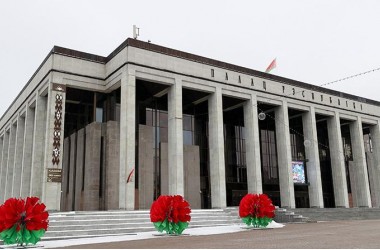It is time to overhaul Belarus' education system, Chairman of the House of Representatives of the National Assembly Vladimir Andreichenko said at the parliamentary hearings to discuss the state and prospects of the national education system, BelTA has learned.
“In the era of globalization, we are witnessing a cut-throat competition for the world's intellectual resources. In such a setting, human capital plays a crucial role in maintaining sovereignty, sustainable development and national unity. Since the main quality criterion of human capital is education, countries all over the world are seeking to create a new type of education system capable of promptly responding to the challenges of the time,” Vladimir Andreichenko said.
Such a task was set at the Belarusian People's Congress. “Today we have to find out whether the amendments to the Education Code stay current with the time and what else needs to be done to achieve this goal. The time is really ripe for education reform. But this does not mean that we should drop the well-established practices that have proven their effectiveness. I believe that we all share this fundamental stance of the head of state. It is more about fine-tuning some important elements of the national education system in order to help it more successfully fulfill its main function - preparing a young generation for an adult life and career in the face of the challenges of today,” the parliament speaker noted.
Vladimir Andreichenko emphasized that the digital transformation of the economy prompted a revolution in the labor market, and this process will keep gaining ground. “Many professions will either disappear in the near future, or will be replaced by artificial intelligence. Unless we take action, our university graduates will not be able to enter the workforce. Already now many companies tend to hire unexperienced workers and train them on their own, because it is faster and cheaper than hiring people who are mismatched to their jobs. In order to increase the competitiveness of Belarusians in the labor market, we need to reevaluate the vocational training system, strengthen the links between education, science and workplace taking into account region-specific demand and building on the competencies needed by the knowledge economy. We need to revise the curriculum and training processes, since the human knowledge is constantly increasing and it becomes almost impossible to stay current with the changes using traditional methods,” Vladimir Andreichenko said.
Of course, it is important to equip young people with a specific set of competencies. But it is much more important to teach them to think out-of-the-box, to navigate the endless sea of information and encourage them to learn throughout their lives. In this regard, it is difficult to overestimate the role of digital technologies that make it possible to invent creative teaching models and flexible learning paths, taking into account individual characteristics, needs and aspirations of students. However, for all the advantages of the internet, the specialization and individualization of the teaching process carry significant risks, which we must also take into account when choosing the path the national education system will follow. Technological progress comes with a price. Today's teenagers spend a lot of time on the internet, which has an impact on their memory, mental abilities and their motivation to study, they develop anxiety and serious health problems. But the main thing is that the social atomization is increasing. Locked in their virtual cells, people cease to see the world adequately, to trust each other, they lose communication skills and ability to solve problems collectively,” he said.
In these conditions, maintaining genuine human and civil solidarity becomes a very difficult task for any state. This is possible only if the society sticks to its traditions and moral values. “Yet, today people all over the world transfer the style of their communication in social networks into real life, believing that here too there are no moral limits and social boundaries for them. Therefore, modern technologies should be perceived not as a panacea, but as a tool that teachers and students should learn to use correctly in order to re-arrange the educational process. For example, we saw the benefits of distance learning, which helped us out during the pandemic. But it should not be used routinely in the post-COVID era. The online format will be really useful if you use it to develop creative thinking, independent work skills and teamwork when solving non-standard problems. But we must not forget that the school should raise a harmoniously developed personality and a worthy member of society, which means that it should teach not only professional skills, but also a holistic perception of the world. And here, live communication between a teacher and a student cannot be replaced by anything,” Vladimir Andreichenko concluded.
The hearings will discuss the state and prospects of the national education system, in particular, apprenticeship programs and industry-driven courses at vocational schools, improvement of classroom processes at higher learning institutions using information and communication technology, enrichment programs for talented and gifted students, the role of the youth movement in the formation of civic responsibility of students.
Taking part in the hearings are members of the upper and lower chambers of the Belarusian parliament, representatives of ministries and state committees, regional executive committees and the Minsk City Hall, other government agencies, educational institutions, employers and public associations.








